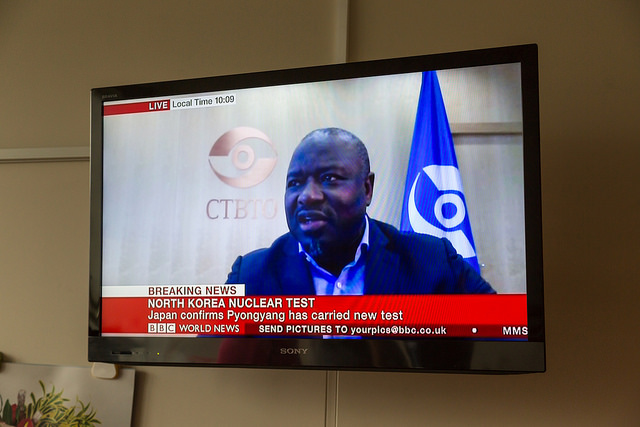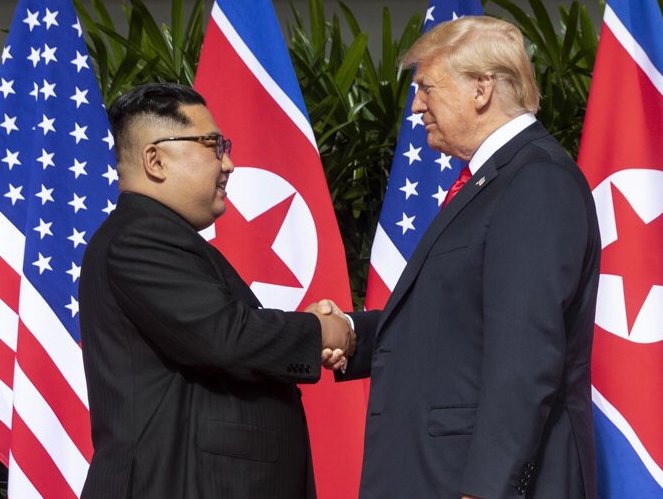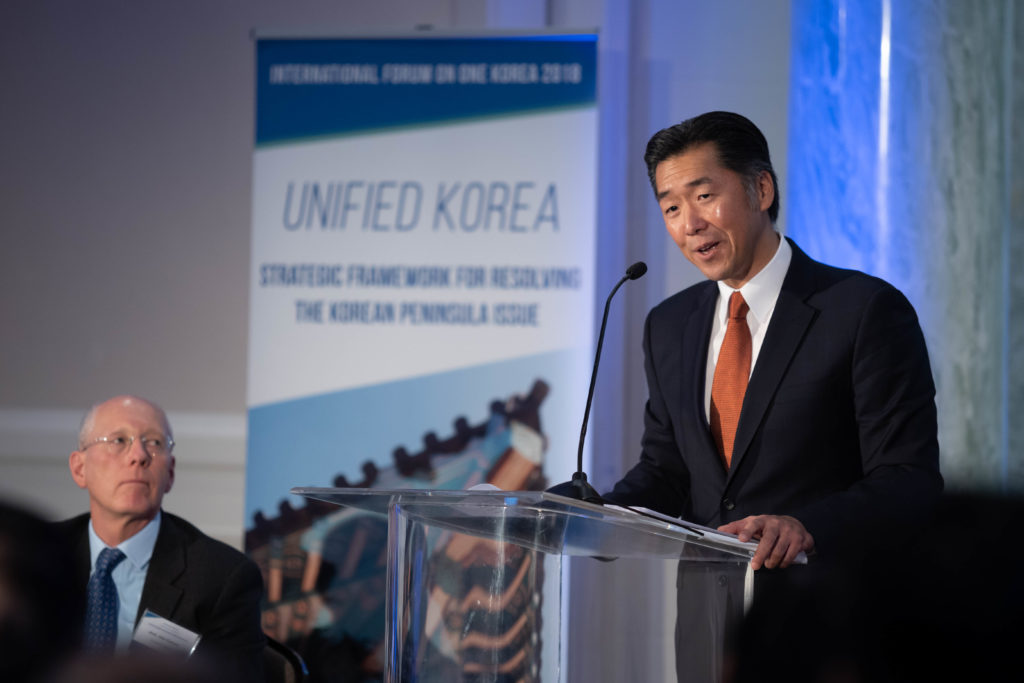In December 2018, Newsweek published the following article from reporter Tom O’Connor on the future of U.S.-North Korea relations that quotes portions of Dr. Hyun Jin Preston Moon’s keynote address at the 2018 International Forum on One Korea in Washington D.C. At the International Forum on One Korea, Dr. Hyun Jin Preston Moon, author of Korean Dream: A Vision for a Unified Korea, called on the United States, South Korea, and other countries to recalibrate their strategic approaches to the Korean peninsula to focus on peaceful reunification.
You can find Newsweek’s full article below or here.
You can find Dr. Moon’s full keynote address at the 2018 International Forum on One Korea here.
North Korea Finally Told U.S. What It Wants, Experts Say 2019 Will Be ‘Dramatic’ Year for Donald Trump and Kim Jong Un
Newsweek
Tom O’Connor
December 20, 2018

A television screen shows video footage of a North Korean missile test in 2017 (Photo Credit: The Official CTBTO Photostream)
North Korea has explicitly defined the terms of its denuclearization agreement, leaving the United States with an ultimatum likely to define an unprecedented peace process as it enters a new year experts said would likely be filled with highs and lows for diplomacy in Northeast Asia.
As a historic warming between Cold War–era rivals North and South Korea approached its one-year mark, the U.S. has found greater difficulty than its Pacific ally in establishing common ground with the notoriously reclusive government in Pyongyang. Still, President Donald Trump and North Korean supreme leader Kim Jong Un have made unprecedented headway in an attempt to solve the decades-long dispute between their nations.
A commentary published Thursday in the official Korean Central News Agency outlined exactly what the young ruler meant when he agreed to abandon his nuclear weapons at a landmark conference alongside the Republican leader in June.
Angered by continued U.S. sanctions and a refusal to declare peace ahead of what the State Department has defined as a “complete, verifiable, irreversible denuclearization,” KCNA contended that Washington’s recent actions could only be chalked up to the “misguided understanding” that only North Korea, officially known as the Democratic People’s Republic of Korea, and not the entire Korean Peninsula, would be denuclearized.
“The United States must now recognize the accurate meaning of the denuclearization of the Korean Peninsula, and especially, must study geography,” the outlet wrote.
“When we talk about the Korean Peninsula, it includes the territory of our republic and also the entire region of [South Korea] where the United States has placed its invasive force, including nuclear weapons. When we talk about the complete denuclearization of the Korean Peninsula, it means the removal of all sources of nuclear threat, not only from the South and North but also from areas neighboring the Korean Peninsula,” it added.
The article did not present a vast change in policy for North Korea, which for years has contended that its development of nuclear weapons was predicated on the threat of a U.S. military invasion, but rather detailed Kim’s vision in more certain terms at a time when the pace of negotiations had at least publicly slowed down. Though the Trump administration has touted some of North Korea’s apparent concessions toward peace—such as a now-year-long hiatus of nuclear and missile tests, the release of U.S. prisoners and the destruction of key military sites—it has said little about what it planned to give up.
“I tend to think that in many ways this is a historic opportunity, something that happens once in a generation,” the University of Southern California’s David Kang said Thursday during a conference hosted by the Korea Society. “Does the U.S. actually have a strategy to move forward, to take this ball and keep it rolling?”
Noting what North Korea has done so far, Kang continued: “The question on the American side is what are we going to do, what are we going to put on the table?”
Trump said in June he would suspend “provocative” U.S.-South Korea military exercises and conducted a watered-down version of its annual faux joint invasion drills in April. While the administration has been firm in keeping up sanctions against North Korea, questions surround a potential declaration of peace, a move that would end the 1950s Korean War that pitted the U.S. and South Korea, officially called the Republic of Korea, against North Korea and communist allies China and the Soviet Union.

President Donald Trump and North Korean supreme leader Kim Jong Un shake hands following a signing ceremony during their historic U.S.-North Korea summit, in Singapore, on June 12.
So far, the U.S. has returned to its denuclearization hardline when approached about potential peace offers. Behind the scenes, however, talks between Washington and Pyongyang are continuing, and a second summit between Trump and Kim is being prepared for sometime early next year—perhaps as early as next month.
As the two sides attempt to reconcile their competing views of how negotiations should develop, former U.S. ambassador to South Korea Thomas Hubbard said the upcoming year would be one of “ups and downs, probably more dramatic up’s and down’s than we had this year.”
“It will be a year of hard work,” Hubbard told the Korea Society gathering. “We have a lot going on in the U.S. that could affect the president’s attitude.”
At the same time, Hubbard believed that even with the Democrats set to take the House of Representatives, Trump’s opposition would not “see it in their interest” to sabotage the current U.S.-North Korea dialogue as “they have such fertile fields in the president’s behavior” as well as over allegations regarding his involvement with Russia and worries of an economic downturn.
According to Kang, while Kim had pursued a “very clear” strategy over the past two years by promising military advances, accomplishing them and then coming to the table, Trump’s vision was less clear. The scholar said that “across left and right, Democrat and Republican, denuclearization is the key priority, keeping sanctions is widely agreed to, but again, as we know, President Trump is a wild card and nobody would have predicted that he was going to meet with Kim in Singapore.”
Both experts agreed that it would be difficult to see the situation escalate to the tense levels of this time last year, if not only because of the level of North-South engagement that’s taken place in the past year.
As Trump grapples with his own domestic issues and formulating a coherent foreign policy, South Korean President Moon Jae-in has managed to soar ahead in terms of joint North-South initiatives that were set to only expand throughout 2019. Kim’s anticipated visit to Seoul may never have manifested, but another inter-Korean summit was likely should the current trend continue.
“I am one American who would like to see South Korea in the lead of this process, bringing North Korea into the world,” Hubbard said. “I’m personally more comfortable with the South in the lead in dealing with the North and perhaps the U.S. advising caution here and there.”
Both Kim and Moon Jae-in have warmly embraced one another in past summits, which have prompted declarations that actually produced tangible results. After demining the Joint Security Area that connects two nations separated by the world’s most heavily fortified border, the two Koreas detonated military positions last month and then conducted joint inspections that amounted to the first-ever peaceful crossing of North and South Korean troops since they were divided by the U.S. and Soviet Union after World War II.

Dr. Hyun Jin P. Moon speaking at the International Forum on One Korea.
Addressing the 2018 International Forum on One Korea held last week in Washington, Global Peace Foundation founder Hyun Jin Preston Moon advocated for a Korean-led approach to peace. He also urged the U.S. to join the two neighbors in adopting reunification as an official policy and forego any sort of military solution to the crisis.
“The U.S. should recognize its inability to execute a narrowly defined endgame, especially when there is a moving goal line, due to wishful thinking and poor planning. This has been proven too often in its recent history. The failed or inconclusive military adventures in Vietnam, Iraq and, currently, in Afghanistan are evidence of this,” Hyun said. “At tremendous cost of life and treasure these conflicts were undertaken with limited objectives. U.S. policy failed to recognize the larger consequences and how much America would need to invest in time and resources to achieve a viable outcome.”
“I urge the ROK, US and other nations to recalibrate their approaches,” he added. “I believe that the U.S. should widen its Korea focus, including denuclearization in the larger context of a unified Korea. A unified Korea should become the clearly stated and actively pursued policy of the U.S. and ROK with the support of the community of nations. That would not mean unification on any terms and certainly not on Pyongyang’s terms. It would look to the aspirations of Korea’s independence movement and finally realize them.”

